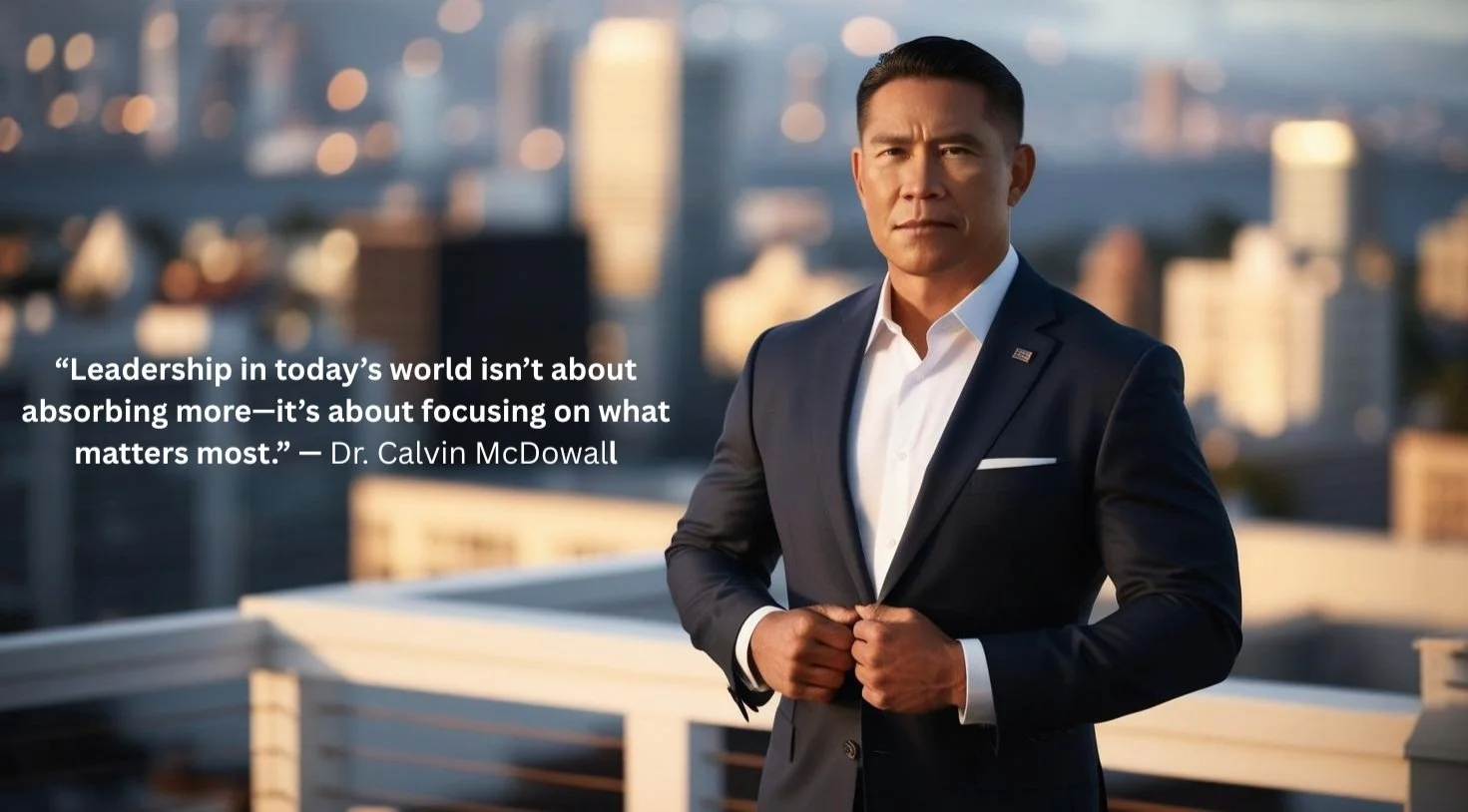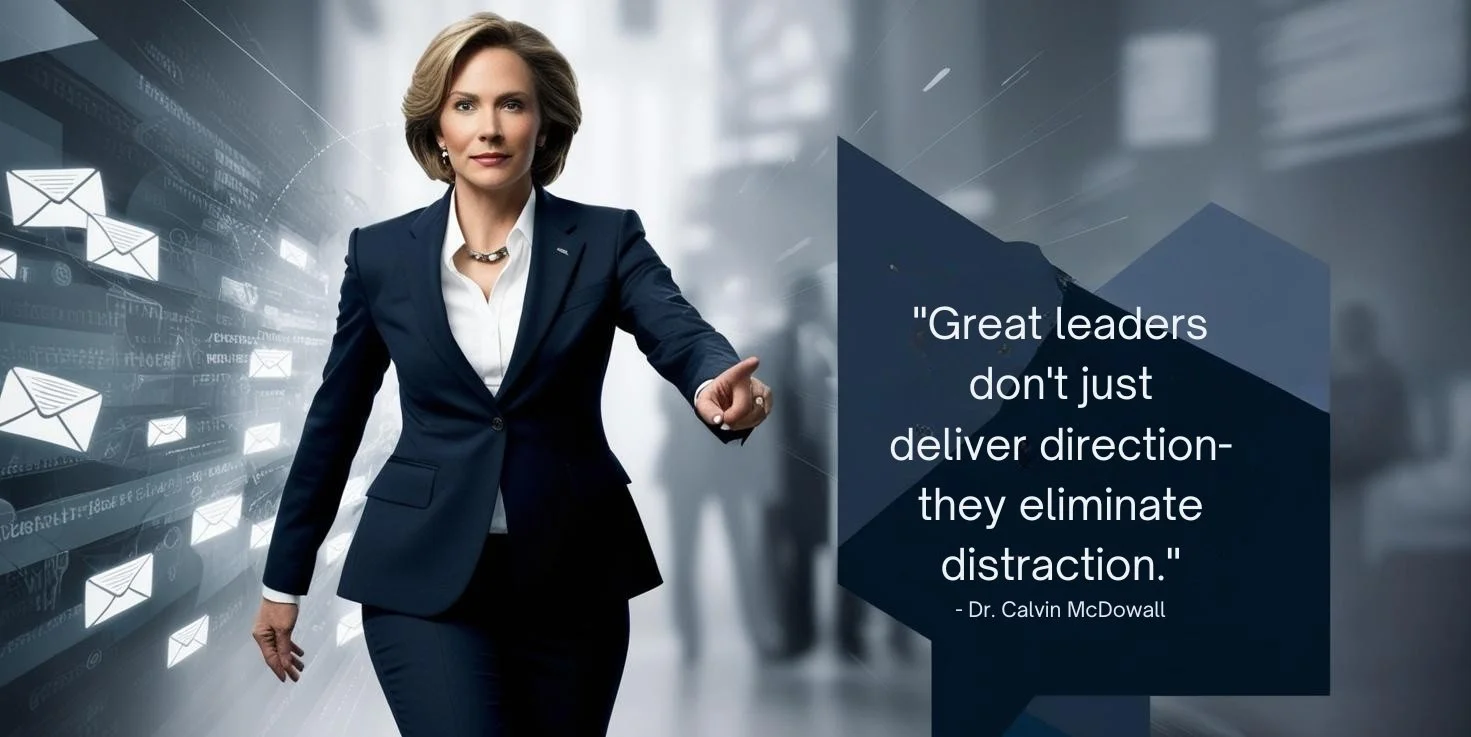Leading Through the Noise: How to Rise Above Information Overload
Practical strategies for leaders to reduce digital distraction, improve decision-making, and build a low-burden, high-performance culture.
Why This Matters to Me
When I began my doctoral journey, I was asked a simple but powerful question: “What business problem do you want to solve?”
The answer came to me instantly.
At the time, I was juggling an overwhelming load of data while tracking the activity and progress of over 500 staff members. Every day felt like a battle just to stay afloat. I was surrounded by dashboards, reports, emails, and notifications, all while facing the pressure to make high-stakes decisions. I was overloaded, and I knew I wasn’t the only one.
So, I leaned into my curiosity. I wanted to know: Are there proven strategies that can help leaders like me manage this better?
That question became the foundation of my doctoral research: “Effective Strategies to Reduce Information Overload in the Workplace.”
What I discovered changed the way I lead forever.
Not only did it help me regain control and clarity in my day-to-day work, but it also enabled me to teach my team how to avoid being overwhelmed by constant input. We started to build smarter systems. We learned to filter out the noise. And more than anything, we reclaimed the focus that fuels progress.
That passion—the drive to help others lead with clarity—is why I’m sharing this with you now.
Can You Read 100 Newspapers in a Day?
Probably not. But here's the wild part—you’re already doing more than that.
Every day, you and I process more information than if we read a hundred newspapers cover to cover. And it doesn’t stop there. The total amount of information created every two days now equals the total amount produced from the dawn of human history up to 2003. Let that sink in for a moment.
We’re constantly hit with a wave of data—emails, notifications, messages, meetings, dashboards, reports. It’s nonstop. As more organizations adopt digital tools and platforms, we’re not just managing systems—we're managing an ever-expanding flood of information that accompanies them.
What Is Information Overload?
It’s when the volume of input outpaces our brain’s ability to filter, process, and respond. As leaders, we’re not just being asked to digest data—we’re also navigating dozens of digital platforms, managing complex relationships, and juggling a growing list of tools we must master to stay relevant.
Even with the best intentions, many organizations end up adding more noise in their efforts to streamline. A new messaging platform? That’s great—until it becomes one more place where you’re expected to be available 24/7. The tools designed to help us can quickly become the very source of our overwhelm.
The Real Cost of Information Overload on Organizations
According to a Gartner survey, 27% of employees report feeling overwhelmed by information, not just swimming, but drowning. Too many platforms, too many updates, too many places to check before they can do the job they were hired to do.
When people are constantly buried under a mountain of information, they lose sight of the bigger picture. They feel disconnected from the company’s strategy and mission. And when that alignment fades, so does loyalty.
Leaders aren’t immune either. Decision paralysis creeps in, clarity fades, and we mistake motion for progress. Information overload doesn’t solve problems—it creates them.
The Personal Toll
Information overload is one of the most frequent workplace stressors. There's even a term for it: 'technostress'—the fatigue caused by our constant interaction with digital systems.
Research shows a clear link between information overload and burnout, stress, and declining job satisfaction. Harvard Business Review reports that the average employee wastes approximately 3 hours and 27 minutes per week dealing with excessive information. That is the time we could reclaim, if we lead more intentionally.
Why Managing Information Is a Leadership Imperative in Today’s Tech-Driven World
With every new system or platform, the volume of data grows. That’s why managing information isn’t optional—it’s essential.
If you're not intentional about how you manage information, you're risking inefficiency—and irrelevance. When you simplify and structure your information flow, you make better decisions, protect your team's focus, and create a workplace where clarity thrives.
In my doctoral research, one strategy stood out clearly: *Breaking from information*. Participants agreed that creating intentional pauses from constant input was vital. These breaks reduce mental fatigue, sharpen focus, and support long-term clarity.
Strategies to Cut Through the Noise
1. **Optimize Information Management**
- Limit the number of channels you use daily
- Use decision frameworks with guiding principles
- Delegate and automate tasks
- Filter and prioritize information by goals
2. **Create a Low-Burden Work Culture**
- Reduce duplication and unnecessary updates
- Establish communication rules
- Ensure leadership messaging is aligned
3. **Design for Focus**
- Encourage scheduled email checks and breaks
- Reduce digital interruptions in your workspace
- Support deep work and team resets
4. **Lead with Clarity and Intentionality**
- Show people they matter
- Eliminate mixed messages
- Make decisions based on verified facts, not opinions
Final Thoughts: Less Noise. More Clarity. Greater Impact.
More information doesn’t equal better leadership. Most of the time, it just means more confusion.
Before you make your next decision, pause and ask: “What do I really need to know?”
That single filter can change everything. Leaders who simplify and focus will thrive in the noise. Those who don’t will get lost in it.
Look at your information flow. Are you reacting to data, or filtering it with purpose? If you’re ready to shift, to lead with clarity, and to build a culture that filters out the noise, then your best leadership work is still ahead of you.
Dr. Calvin McDowall is a leadership strategist, international bestselling author, and executive with over three decades of experience in healthcare leadership, military service, and coaching. He empowers leaders to navigate change, lead with purpose, and transform challenges into opportunities. Through storytelling and relatable analogies, Dr. McDowall is on a mission to make leadership more digestible, impactful, and memorable for today’s world changers.
© Dr. Calvin McDowall. All rights reserved. This post reflects original insights and research on leadership. Do not reproduce without permission.



